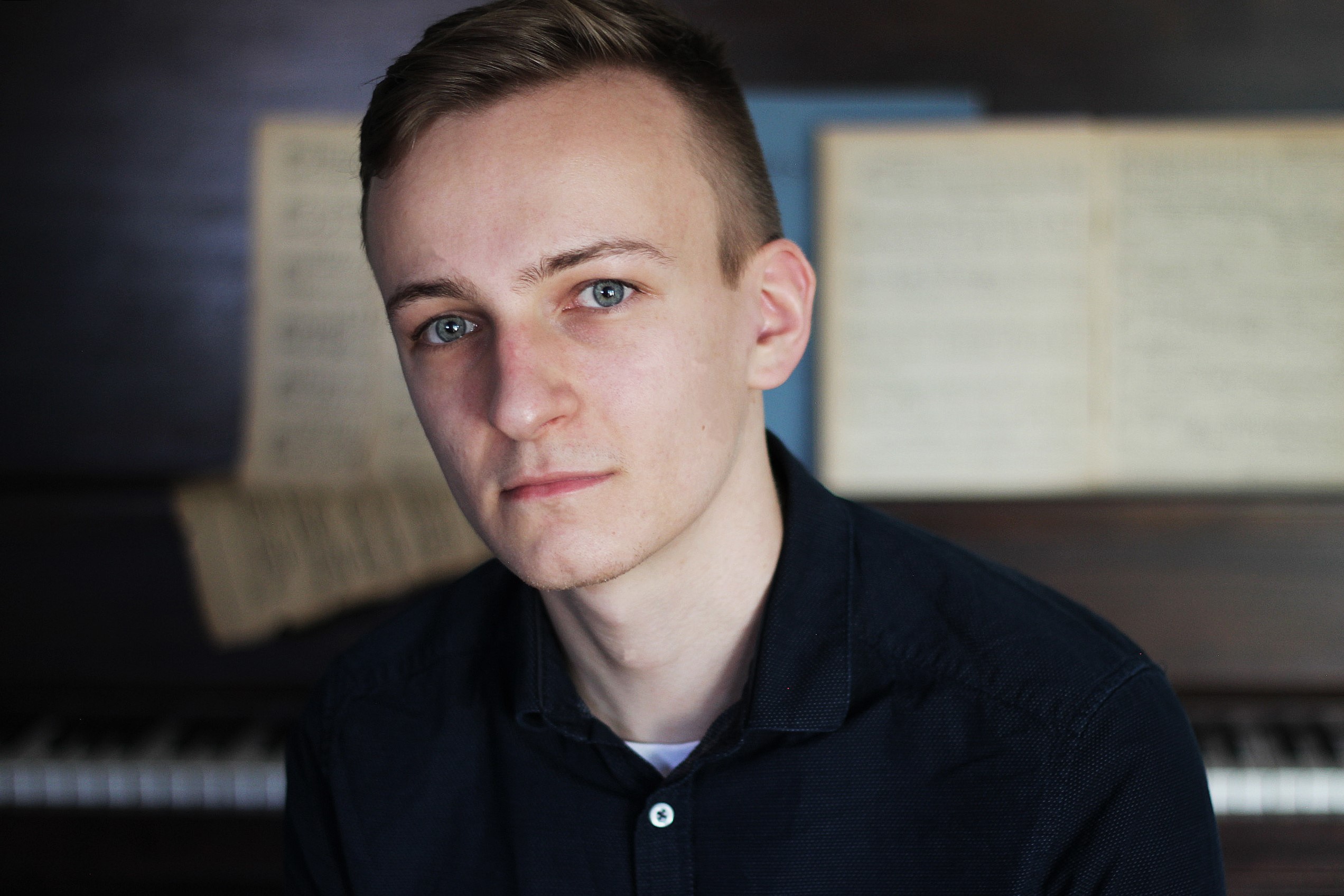CMC Ontario Regional Director Joseph Glaser sat down with HPO composer Fellow, Michael Maevskiy to discuss his participation in the Hamilton Philharmonic Orchestra Composer Fellowship program.
The program was launched in collaboration with the Ontario Region of the Canadian Music Centre in our 18-19 Season. The program is aimed at connecting early career composers with professionals in the orchestral world to nurture and develop new skills through mentorship and the creation of a new work.
On May 1st, 2024, the Hamilton Philharmonic Orchestra Premiered Michael’s work Serenade conducted by Gemma New as part of Michael’s fellowship with the orchestra.
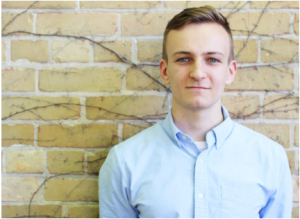
Joseph Glaser: Tell me a little bit about your background, how did you get into music?
Michael Maevskiy: I started piano lessons somewhat by chance when I was five after my grandpa got me a small keyboard. My parents said I spent a lot of time playing on it. One weekend, I accidentally left it on while we were away, and it stopped working. That led my parents to buy me a full keyboard, and soon after, lessons began.
I remember clearly there was a time when I wanted to stop doing music, and then there was another point in time where I knew music was the only thing I could do. At the start, I played piano because that’s what my parents wanted me to do. It was only when I started getting better at playing piano when I started to really enjoy music. When I was playing more educational pieces it felt more like a chore. Then, once you get to more interesting repertoire, and you’re able to enjoy playing it, then it’s like “wow, this is kind of fun!”
Then at some point I started experimenting with compositions in GarageBand. I just had these melodies come into my head and I just wanted to write them down. My piano teacher eventually encouraged me to write music by hand, encouraging me to put some structure to it. That got me interested in the composition process. In high school, I remember having fun plucking away at the free notation software I had access to, creating a piece of music overnight. In hindsight it was a moment where I was able to create without inhibitions, and that’s maybe something to cherish. On the other hand, I have a bunch of these funny Garageband audio files of flute, organ, and maybe even me humming these tunes. Sometimes it’s a fun memory trip to go listen to those old MIDI recordings and think “whoa, that happened”.
I then sought out a harmony teacher, and after spending some time studying music more “seriously,” I knew I wanted to apply to university to properly study composition.
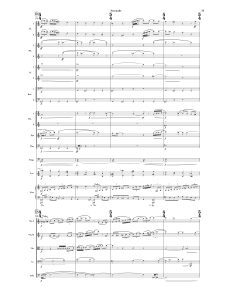
JG: You grew up in Toronto and now you’re living in Kingston, which is sort of the opposite of what one would normally think a person’s career trajectory would take. Can you talk a little bit about that decision of why you decided to move to Kingston and outside of the provincial urban centre for your career?
MM: I think I made the choice to move to Kingston to have a bit of a change of pace. I’ve always been more of a big city person, and I miss a lot about Toronto—especially the concerts. There was always something happening, and the new music groups I wanted to hear would come through regularly. But despite that, I was stuck in a cycle of working my serving job, traveling 1 hour between students in the evening – only being able to schedule 3 students a night, coming home, and repeating the process. I wasn’t even going to concerts because I had work all the time.
Kingston offered a nice alternative. During the pandemic, with serving jobs on hold, I realized I wanted more space, a piano studio, and to pursue my teaching business—without the “live to work” mindset. Moving here allowed me to build that. Now, I work fewer hours, all within the music community, freeing up my mornings to compose. I’m grateful to have some motivated students – their energy helps keep the work easy.
The music community here has been incredibly welcoming. Kingston has a very vibrant arts scene. It was slow to reopen after the pandemic, but now, I’m amazed at how much music happens and how dedicated people are to making it work. There are many composers, musicians, and teachers here. As a composer, being here is also practical—I’m kind of in between the major cities like Montreal, Ottawa, and Toronto.
JG: Tell me a little bit about the piece. How did the acoustics of the space factor into your compositional thinking?
MM: There’s this one piece that I absolutely love, Ravel’s Introduction and Allegro that is written for a pretty small group, for harp, flute, clarinet and string quartet, and it just always takes me aback by how it sounds so huge. There are moments in the piece where you go “there’s no way that’s not a full orchestra!”. I wanted to create that kind of fullness because I knew that I would be writing for chamber orchestra, as part of the “Intimate and Immersive” (I&I) series. In previous years, the ensemble at the I&I concert was even smaller, with strings playing one-on-a-part so I was preparing myself for an even smaller instrumentation than what I ended up writing for. I was also thinking back to the other “Intimate and Immersive” concerts I attended in that space [The Cotton Factory] and how fascinated I was with how that ensemble with one-on-a-part sounded so full because the space just carries the music and the resonance of the sound. Maybe it’s the wooden floors, or that the performance space is on the third floor of an older factory building, but it’s a magically resonant space. I remember it being a very visceral feeling. That is the part that excites me the most, when you can actually feel the music inside.
This became my main goal – to use the resonant properties of that space to make this piece sound big and give the audience that visceral experience that was so prominent in my memory of those concerts.
JG: What is the role of melody in the piece? The work is called “Serenade” which has allusions to song, so how did that make its way into the music?
MM: I often come up with the title after the piece is completed. For this piece, I was thinking more along the lines of the idea of “serenading” someone, rather than the musical or melodic associations. So, the idea of sending music out to a listener rather than this being a “song”. I was imagining that the loudness and the resonance that I was creating was, in a way, embracing the audience, engulfing the listener. Kind of like “sonic hugs” in a way, which is a bit strange to say, since the chords are dense and dissonant – not what you would traditionally associate with a hug! I just imagined these big visceral moments for the listener.
Though also, now that I think about it, there is a melody that comes through in the piece, so you do get that other sense of Serenade in the end as well. I do think that’s maybe a function of when I thought of the title, I then wanted to make it happen in the piece. Though the “engulfing chords” was the initial thought.
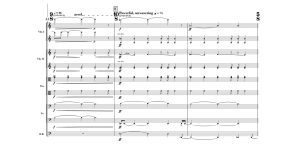
JG: What is the experience like working with the HPO?
MM: I think it really built up my confidence. It is an incredibly unique opportunity to build on your professional skills as a composer, especially as someone who is not currently in school and just starting a freelance career. The fellowship felt like an accelerator program on what a real professional composer, working with a professional ensemble within an organization would look like. It’s really valuable to be able to not only to observe the rehearsals but also get to know the staff and the inner workings of the organization. It was really such a welcoming experience! A big thank you to our mentor and HPO’s composer-in-residence Abigail Richardson-Schulte, HPO’s executive director Kim Varian, and all the staff, for making us feel so welcome every time we came to the hall.
A huge part of the experience was Abigail’s mentorship. She took the fellows under her wing and then pushed us to put ourselves out there. She would encourage us to participate in events and experiences that were unfamiliar to us. We always felt that she believed in us, and she encouraged us to just get out there and we would. I think over the course of the year we gained all these skills to stand on our own. A big lesson for me was public speaking; being able to talk cohesively in front of people, for example – lead discussions with the “under 30” crowd or talking to donors and the board. Skills I never really learned in university. All-in-all the program challenged me to take on new roles for myself and adapt my thinking of what the role of a composer is in the organization.
It’s also an invaluable experience just to go and see how a professional organization functions. I was fortunate to be able to go to every concert and see the process of putting the music together from the first rehearsal to the final performance. I also had the kind of privilege of seeing multiple conductors come through because my tenure coincided with the HPOs search for their new music director. Between the different conductors, visiting musicians, and visiting composers, it was fascinating to experience all the different approaches and ideas coalesce into the season. In a way it was quite overwhelming, but in the best possible way. It’s a very full experience every time you’re there.
Another great moment of working with the HPO was the chance to work on my piece with Gemma New – I was very grateful to have her conduct my piece. That on its own was a great experience, observing how much the orchestra really flourished as she conducted. And it was especially wonderful seeing how my piece came to life, from the first run through, to the concert performance.
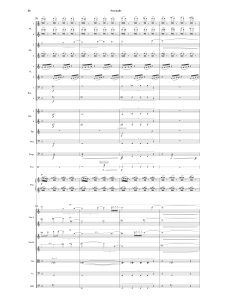
JG: What are some takeaways you have from the experience?
MM: A lot of the things I learned, I think are just related to practicality. Again, I cannot again thank Abigail enough for her help with these things. You realize the importance of the timeline for how the piece is put together, how little time you have in rehearsal, and the implications on the practicality of what you write. You know, you maybe have in total 35-40 minutes with the orchestra and that’s already a gift. You get a run through, little bit of rehearsal, another run through, another little bit rehearsal and then it’s already being put on stage. It all happens super quick. So then, your material has to be spot on. Any questions that would come up have to be taken care of before the first rehearsal because you only have 25 minutes.
Over the course of the year of being there as part of the program, you’ll also get some feedback of what musicians like to play. Often that’s music that is kind of understandable. This highlighted for me the necessity of having the music make sense, i.e. the material is logical, it’s clear, there’s no questions, and the musicians have a seamless experience playing the piece. I sort of knew this coming in, but it was confirmed for me and even impressed upon me even further.
I’m coming to that realization a little bit more that as a composer, understanding the orchestra world takes a bit of time. It’s its own thing and it takes a bit to figure out how to meet its requirements while writing something that you want to write. That’s the tightrope that this program has helped me navigate.

